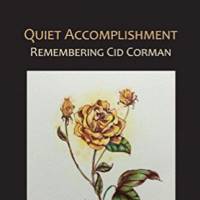Minor artists fear — and not without reason — that the ideas and visions of which their art is made are finite. They hesitate to share, therefore, and are jealous of other artists, especially young ones who threaten to supplant them.
Quiet Accomplishment, by Gregory Dunne.
Ekstasis Editions, Poetry.
The strongest evidence that Cid Corman was a major artist is, of course, his own poetry, but augmenting that is his magnanimity.
Corman began his poetry journal "Origin" in 1951 and continued it for 30 years, even after he had moved to Japan. It provided a showcase for adventurous American poets, many of whom — including Gary Snyder, Charles Olson and Robert Duncan — went on to become better known than he was. He conducted an enormous correspondence that served in large part to introduce members of the poetry world to each other and his door in Kyoto was always open. One of the young poets to walk through that door was Gregory Dunne, and, in Quiet Accomplishment he has given us a book that is worthy of its subject.
"Quiet Accomplishment: Remembering Cid Corman" has its genesis in several discrete pieces Dunne wrote about Corman over the years, but it never feels like a hodgepodge.
The opening chapter recounts Dunne's first meeting with the poet; the last is set nine years after Corman's death. In between those chapters we are treated to an illuminating interview with the poet, a consideration of Corman as translator (his version of Basho's "Narrow Road" is one of the best we have), and an account of Corman's last days.
The one who remembers; the one who is remembered — in "Quiet Accomplishment" Dunne brings the two together and demonstrates how fruitful the intermingling of criticism and memoir can be.


















With your current subscription plan you can comment on stories. However, before writing your first comment, please create a display name in the Profile section of your subscriber account page.